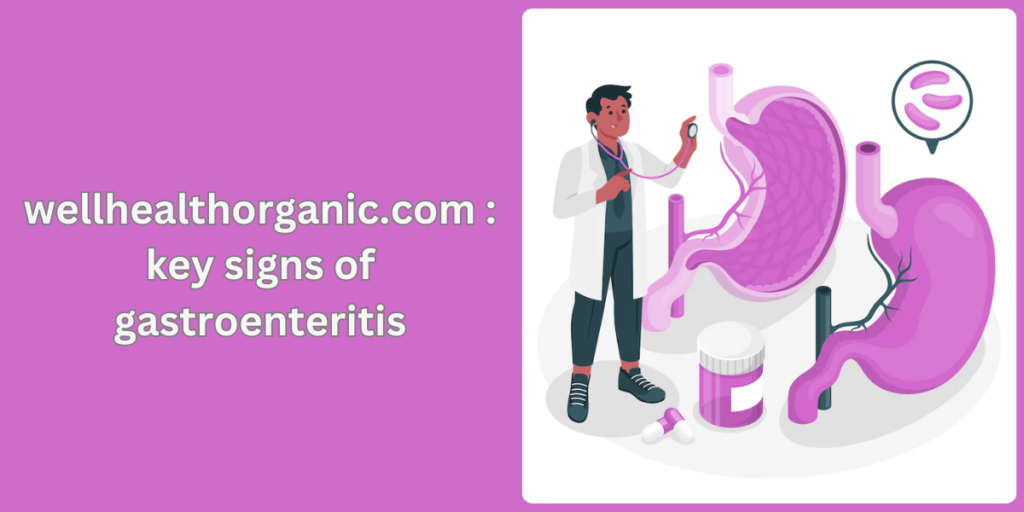Gastroenteritis can be described as inflammation of your stomach or intestines) or Irritation. The symptoms may therefore entail abdominal pain, cramps, nausea, vomiting and diarrhea. The inflammation often regards an individual’s effort to protect oneself against infection by particular types of microorganisms, for instance virus or bacteria.
wellhealthorganic.com : key signs of gastroenteritis Nevertheless there are also fungi and parasites that may trigger an infection that causes gastroenteritis as well as chemicals that irritate the lining of the stomach and intestines resulting in it.Gastroenteritis can be defined as having infections coupled with inflammation within your gut.
Gastroenteritis Symptoms
wellhealthorganic.com : key signs of gastroenteritis is characterized by having several symptoms that can come on with little warning. Most of the time it makes you nauseous, get stomach cramps, diarrhea and sometimes vomit. This helps one expect to make several trips to the toilet especially in a short span of time.
Other symptoms tend to develop a little later on and include:
- Belly pain
- Loss of appetite
- Chills
- Fatigue
- Body aches
- Fever
For the same reasons, you also can be dehydrated through diarrhoea and vomiting. Some of the symptoms that one should look out for include, the skin- it becomes dry, when you open your mouth to talk or even smile, your tongue can be seen being dry. If you experience any of these symptoms then you should contact your doctor.
Long does gastroenteritis last?
wellhealthorganic.com : key signs of gastroenteritis It is true depending on what leads to it. But in most cases acute gastroenteritis only lasts for about 14 days. Protracted gastroenteritis usually lasts between 14 and 30 days and chronic gastroenteritis is usually more than 30 days.
Stomach Flu and Children
Children and infants are amongst the most affected by the vice since they are easily dehydrated. If they do, they should seek the services of a doctor as soon as possible.
The following are some of the symptoms of dehydration in kids:
- Trauma of head and specific position on your baby’s head that looks somewhat concave or squashed.
- Sunken eyes
- Dry mouth
- Another form of presents is that he/she does not cry when he/she cries
- Not urinating or urinating sparingly.
- Fatigue means tiredness and drowsiness or sleepiness also referred to as somnolence
- Irritability
When it is the type caused by an infection which is often viral, then this type of gastrointestinal illness is actually infectious. Kids below the age of fifteen are the most affected by the disease and they are the ones who show severe symptoms of the illness. Children that develop gastroenteritis should be allowed to stay away from daycare or school until such time that he or she is asymptomatic.
Two vaccines are available by mouth to help protect children from infection with one of the most common causes of viral gastroenteritis: It is rotavirus… The two of the vaccines are called RotaTeq and Rotarix. It is a device to feed children and parents can have them starting with the age of two months.
Gastroenteritis Causes
Viral infections are the most frequent cause of gastroenteritis. The usual forms of these are norovirus and rotavirus. You frequently get exposed to a virus through:
- Someone who has an infection
- Sharing your meal or utensils with someone having an infection
- The consumption or water that is tainted with the virus
- Contaminated surfaces made contact with your mouth unwashed hands
Norovirus
Norovirus is extremely infectious, which means it has a rapid and easy way of spreading.
Symptoms typically appear around 12-48 hours after exposure. For about 1-3 days persons will be sick, but they can still pass on the illness up until 2 weeks when they begin feeling much better.
Rotavirus
Rotavirus can affect both adults and children, but the latter seems to show more severe symptoms like dehydration. It can occur at any time; however, it peaks from January until June in the United States. It is mainly spread amongst children who are mostly infected during this season and can spread fast through direct contact with friends and relatives.
You will most likely start to show symptoms 1-3 days following exposure. You would be ill for about 5-7 days and still contagious for several more days after you start feeling better.
Astrovirus
Astrovirus normally leads to a mild infection that results in watery diarrhoea. However, anyone can get infected by it though most adults are immune due to having had the virus previously. This kind of virus usually infects:
- Children under five years
- Seniors aged sixty-five years or above
- People living with suppressed immunity because of HIV infection cancer or chemotherapy drugs
The manifestation period for its symptoms is approximately four to five days post-exposure while duration of illness would take around one to four days long.
Adenovirus
Adenoviruses are subtyped, therefore in the world of adenoviruses there are many strains available. If one is blessed with the virus, then the normal features that are expected include coughing, having a running nose and fever. However in rare cases, adenovirus infection may cause stomach disorders. Infants below the age of 5 are usually the most affected by these however anyone can contract it. On the other hand, adults who get infected mostly live in congested areas like dormitory centers or military camps . If you also have an immune system that is weak then your chances of getting it will increase significantly.
The incubation period lasts between 3-10 days after exposing oneself; hence symptoms will persist for two weeks. Besides respiratory signs like cough may take time before they disappear entirely.
Bacteria
Additionally, stomach flu may also be triggered by bacteria such as Escherichia coli and salmonella virus-like infections but they are less common than those caused by viruses.
On its part Shigella bacteria frequently circulate around day care centres since they often spread from one individual to another and common means of transmission include contaminated food or water.
Preventing Gastroenteritis
Gastroenteritis is a type of infection that cannot be easily avoided, but there are some preventive measures you can take to avoid transferring the germs to someone else and also keep yourself from falling ill.
- Hands are the most important objects to wash for preventing infection. To do this, follow these simple steps; 20 seconds with soap under running water.
- Clean surfaces thoroughly– All surfaces touched by a person with germs need to be cleaned and disinfected.
- Handle food safely- It is important to wash hands before and after handling food. Rinse fruits and veggies before you eat them. To be safe, only serve and store food that is already cooked.
- Eat safe when you travel- You will come across germs that you would not have otherwise when you travel. Therefore, it can accredit travelers’ diarrhea. Drink bottled water and refrain from buying foods that are not peeled, or pre-cooked.
Take medicines as prescribed by your doctor or followed package directions for over-the-counter drugs.
- Get vaccinated– The vaccines are given to children to prevent rotavirus infection.
Conclusion
wellhealthorganic.com : key signs of gastroenteritis happens when an infection inflames the intestines and stomach. This illness has an impact on the body causing feelings of sickness, throwing up, and loose stools. These symptoms can lead to a loss of water from body tissues. How long the symptoms last depends on what triggered the illness to begin with.Normally, though, it takes just several days for the infection to heal as long as you have a good immunity system in place.
Read More Our Blogs



